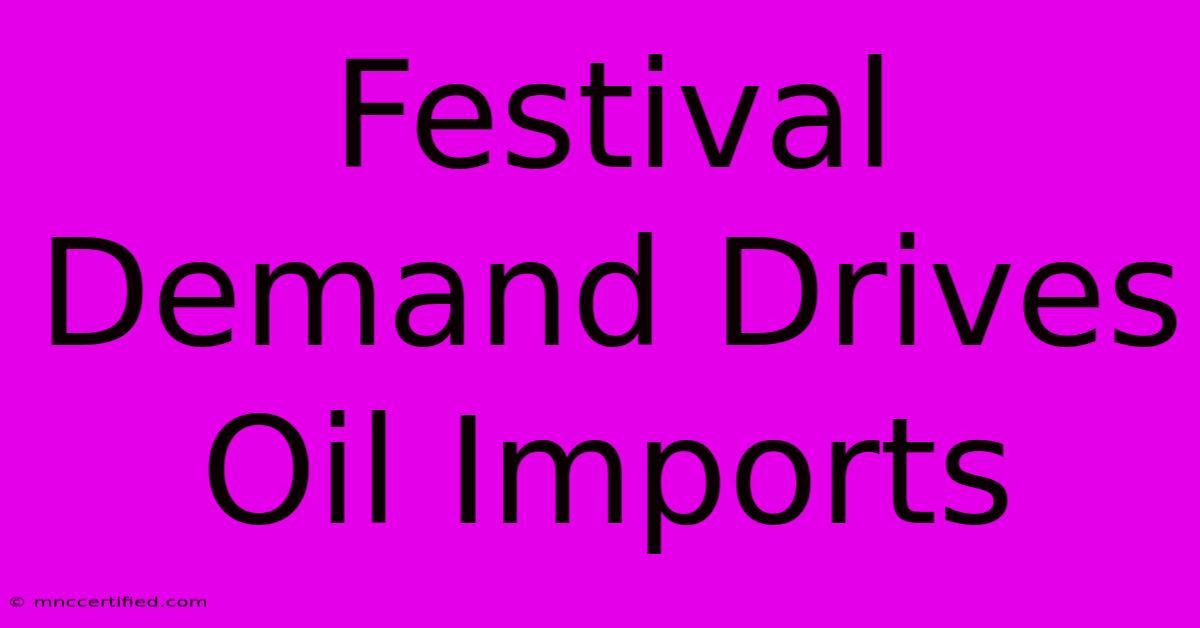Festival Demand Drives Oil Imports

Table of Contents
Festival Demand Drives Oil Imports: A Seasonal Surge
The vibrant tapestry of global festivals, from the dazzling lights of Diwali to the electrifying energy of Carnival, contributes to more than just cultural richness. These celebrations significantly impact global oil markets, driving a seasonal surge in oil imports that ripples through the global economy. This article delves into the complex relationship between festival demand and the resulting increase in oil imports.
The Festive Fuel Factor: How Celebrations Impact Oil Consumption
Festivals, by their very nature, are energy-intensive events. The increased demand stems from several key factors:
-
Transportation: Millions travel to attend festivals, leading to a significant spike in road, air, and rail travel. This increased transportation directly translates to higher oil consumption. Think of the massive influx of vehicles during Mardi Gras or the countless flights to religious pilgrimage sites.
-
Illumination: Many festivals involve elaborate lighting displays, from the twinkling fairy lights of Christmas markets to the dazzling fireworks of New Year's Eve. These spectacular light shows rely heavily on energy generated, often from oil-based sources.
-
Production and Manufacturing: The creation of festival-related goods, from costumes and decorations to food and souvenirs, necessitates substantial energy input throughout the manufacturing process. This adds to the overall demand for oil.
-
Tourism and Hospitality: The hospitality sector experiences a boom during festivals, with increased demand for hotels, restaurants, and entertainment venues. The operation of these establishments consumes considerable energy, often relying on oil-derived fuels.
Case Studies: Specific Festivals and Their Oil Impact
Analyzing specific festivals helps illustrate this point. For example:
-
Diwali (India): This festival of lights sees a massive increase in electricity consumption, much of which is generated using fossil fuels. The associated travel and economic activity also drive up oil demand.
-
Carnival (Brazil/Worldwide): The vibrant parades and celebrations require significant transportation and logistical support, resulting in a notable increase in oil consumption.
-
Christmas and New Year's Eve (Global): These globally celebrated events see a surge in travel, increased energy consumption for lighting and heating, and a boost in manufacturing and retail activity, all contributing to higher oil import needs.
Geopolitical Implications: The Seasonal Swing in Oil Prices
The seasonal surge in oil demand during festival periods can significantly influence global oil prices. This increased demand, coupled with potential supply chain bottlenecks, can lead to:
-
Price Volatility: The fluctuation in demand creates price instability, affecting both consumers and businesses reliant on oil.
-
Geopolitical Tensions: Countries heavily reliant on oil imports might experience increased vulnerability during these peak demand periods, potentially leading to geopolitical tensions.
-
Strategic Stockpiling: Governments and oil companies might engage in strategic stockpiling to ensure sufficient supply during these periods of heightened demand.
Mitigating the Impact: Sustainable Practices for Festive Celebrations
While the festive surge in oil imports is a significant challenge, it’s not insurmountable. Promoting sustainable practices during festivals can help mitigate the negative environmental and economic impact:
-
Promoting Public Transport: Encouraging the use of public transport can significantly reduce the reliance on private vehicles.
-
Energy-Efficient Lighting: Switching to energy-efficient LED lighting can drastically cut down on electricity consumption.
-
Sustainable Materials: Using eco-friendly materials for decorations and souvenirs reduces the environmental footprint.
-
Responsible Tourism: Promoting responsible tourism practices, such as minimizing waste and supporting local businesses, can help create more sustainable celebrations.
Conclusion: Balancing Tradition with Sustainability
Festivals represent a crucial part of global culture and heritage. However, understanding their impact on oil imports and actively seeking sustainable alternatives is essential for a more balanced and environmentally conscious future. By embracing sustainable practices and promoting energy efficiency, we can celebrate our traditions without compromising the planet's well-being. The challenge lies in finding a harmonious balance between cultural celebration and environmental responsibility. The future of festivals hinges on this delicate equilibrium.

Thank you for visiting our website wich cover about Festival Demand Drives Oil Imports. We hope the information provided has been useful to you. Feel free to contact us if you have any questions or need further assistance. See you next time and dont miss to bookmark.
Featured Posts
-
New Jersey Drone Activity Increases
Dec 12, 2024
-
Rovers 4 2 Victory Over Sheffield
Dec 12, 2024
-
Corbin Burnes Pitching Updates And News
Dec 12, 2024
-
Carreys Return Financial Reasons Cited
Dec 12, 2024
-
Mlb Rumors Red Sox Doubt Burnes Trade
Dec 12, 2024